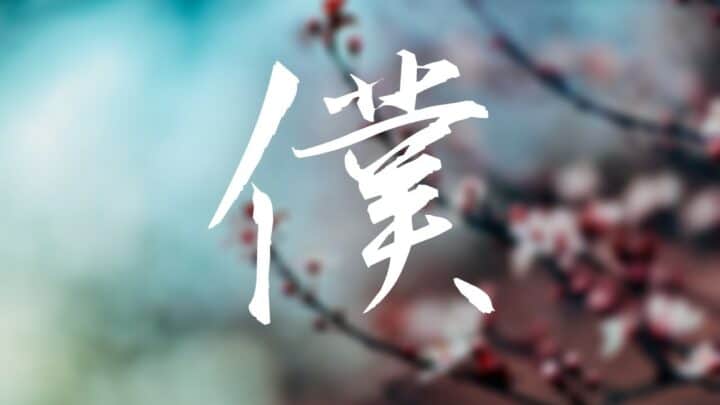We’re going to tackle boku-no in this article and come to understand it through and through.
To do this we’ll learn a little vocabulary, a little grammar, and a little history.
Step one: Let’s give the simple, straight-forward answer.
What does boku-no mean?
Boku means “me” or “I.” No is a particle indicating possession or relative connection. Therefore, boku-no simply means “my.”
Step two: Let’s get down to the nitty-gritty!
How do you write boku in Japanese?
Starting off with the easy part! There’s only three ways to write boku in Japanese. First, in hiragana as ぼく. We can also use katakana to write it ボク. And, finally, we can use the kanji character 僕.
Boku in ample detail
Boku is, on one level, very simple. It just means “I” or “me.”
However, nothing is ever quite so simple in the Japanese language.
In Japanese, there are multiple different words for the simple pronoun referring to oneself.
If you’re male, then you get three common ones to choose from. There’s watashi, ore, and boku.
When translated into English (or most languages, for that matter), you’ll never be able to tell the difference. The distinction just doesn’t exist in most languages.
So, what is the difference? Well, not using a pronoun is your safest bet. Just like we’ve talked about with other pronouns like omae, and even kisama, you can usually leave out pronouns and simply rely on context to make clear who you’re talking about.
If you absolutely must make it clear that it’s yourself that you’re talking about, watashi is a fairly safe bet. You’ll hear from some people that it’s too formal and from others that it’s too effeminate.
For our purposes none of this is true. Watashi is a safe, even toned pronoun to use for beginner and even intermediate Japanese speakers.
Ore is a bit of a dangerous trap. It can come across as too masculine and therefore aggressive. If you can’t afford to possibly sound rude, avoid ore.
So, what about boku? Boku is fairly safe for men and boys to use. That said, in some contexts, when used by an adult male, it can make them seem a little boyish.
Women are welcome to use these pronouns, of course. You’re not breaking any rules by doing so, but you are definitely toying around with some gender expectations.
However, I’ve definitely heard some ordinary women use words like watashi and boku in ordinary situations.
Your mileage may vary.
No in ample detail
No is a grammatical particle that indicates belonging.
What’s a particle? It’s very common in East Asian languages and is a sort of word that has no real meaning on its own. What it does is modify other words and provide grammatical context to the sentence.
There’s particles that indicate direction, time, questions, and more.
The particle no that we’re talking about today has a few different uses, but we’re going to focus on just one in this article: possession.
In effect, no can be thought of similarly to the apostrophe-s in English.
It’s that simple. Finally! A simple concept in Japanese!
So, when we apply it to boku in boku-no, we get the personal pronoun plus the possessive particle. This gives us the English equivalent “my.”
You can also link these の’s, as you could in English. So, you could write:
僕の友達の先生の母の猫の足は白い色だ。
Boku-no-tomodachi-nosensei-no-haha-no-neko-no-ashi wa shiroi-iro da.
My friend’s teacher’s mother’s cat’s foot is white.
Quick note: No is almost always written with the hiragana の. You may, on rare occasion see it written with the katakana ノ.
And you may also see the kanji 之 or 乃used to write it, especially on old timey signs, or in old names of places.
How do I use boku-no?
Let’s take a look at some example sentences, starting with the title of a very popular anime!
僕のペンはブルだ。
Boku-no-pen wa buru da. My pen’s blue.
今年の僕の誕生日は月曜日に当たる。
Kotoshi-no-boku-no-tanjobi wa getsuyoubi ni ataru.
This year my birthday lands on a Monday.
Note that you can turn “my” into “our” very easily, just by adding ra to boku. Let’s take a look at the word bokura, which means “we,” real quick by using this example from a Dragon Ball video game commercial’s tag line.
僕らはみんな、孫悟空だ。
Bokura wa minna, Son Goku da.
We are all Son Goku.
So, with that in mind you could say:
Alternatively, you can attach tachi to the end.
僕たちの友達の子犬は可愛い!
Bokutachi-no-tomodachi-no-koinu wa kawaii!
Our friend’s dog is cute!
The history behind the word boku
In ancient Chinese, the character used to be a pictograph depicting a slave. The oldest form shows them carrying a basket, being whipped, and having a tail. Crazy!
Over time, the character was simplified quite a bit until we ended up with the kanji 僕.
When the character made its way over to Japan, centuries and centuries ago, it also meant “slave.” Then it came to be used as a pronoun that indicated one’s humility when speaking about themselves.
In the Meiji Era the word had a huge shift in meaning when it started to be used by academics (who, at that time, were mostly men). This gave it a new connotation—one of refinement, politeness, and culture.
Eventually the word started to be used by boys and men of all sorts. It still carries some of that gentle tone, and can be a way for men to soften their image when speaking about themselves.
Because it’s used all the time by young boys, you can actually use it as a second-person pronoun if speaking directly to a very young boy.
Final note! The kanji 僕 can still refer to a slave! However, in this case it’s pronounced shimobe. You may also see the word written in manga, but pronounced yatsugare.
This is an outdated usage and can give the person speaking a sense of being from the old world, or perhaps speaking in an archaic way.

“I’ve lived in Japan on-and-off for the last five years, travelling to (almost) every corner of the Land of the Rising sun. I’ve deepened my love of the language with big hauls from Sapporo book stores, by chatting in Shinjuku coffee shops, drinking in Osaka “snack bars,” exploring distant Okinawan islands, and hitching rides with monks in Aomori. Japanese is a wide and deep language, and I’m always eager to dive in deeper.”

